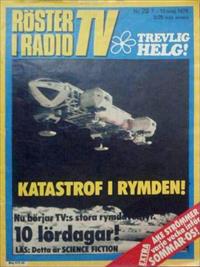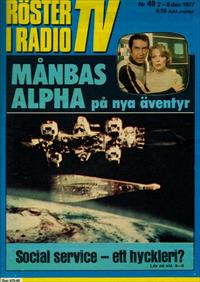Press
Swedish articles
TV listing magazine in Sweden, 1976 and 1977.

Swedish TV listings magazine: Röster I radio TV, 7-13 May 1976, when the first episode of Månbas Alpha 1999 was shown. The title "Katastrof I Rymden" means "Disaster In Space".
"Nu Börjar TVs stora rymden - 10 lördagar! - LÄS: Detta är science fiction" -
Now TV's big space starts: - 10 Saturdays! - Read: This is Science Fiction".



The article, by Goran Bengtson, tries to explain science fiction to Swedish audiences ("the Swedes in general have a rather difficult time with the fantastic", pointing out it hard to even translate the term to Swedish). A section is devoted to "Disaster on the Moon", describing the series (quoting Theodore Sturgeon "ninety percent of all science fiction is rubbish" and Wernher von Braun's recommendation of the series).

Röster I radio TV, 2-8 December 1977. "Moonbase Alpha on new adventures". The second batch of episodes were shown.


Over a year later, four new episodes were shown, and the magazine again had a cover story, this time with an interview with director Charles Crichton (named throughout as "Chrichton"). Here is an English translation:
Caption: This is what it looks like on moonbase Alpha.
Charles Chrichton, the director of the English series moonbase Alpha, which is now returning to TV1, says in an interview with Röster i Radio-TV: "There is a strong desire for science fiction. The fact that so few series are made is due to the enormous demands placed on imagination and money." BY LENA RYDIN
It was not easy to get hold of Charles Chrichton, director of Moonbase Alpha, the English science fiction series.
When I finally reached him, on a blurry phone line from London on a Saturday morning, he wasn't in the mood to talk about Moonbase Alpha.
For Charles Chrichton, the TV series is a finished story from a year ago. Forty-eight episodes of such a complicated series was not an easy TV series to put together. Barbara Bain and Martin Landau, the two main characters, have returned to the USA and Chrichton himself is in the process of filming a new TV series, "The Professionals", which takes place entirely on Earth.
But he still allows himself to be interviewed, slightly reluctantly but with English politeness. Now what about Moonbase Alpha?
I was asked if he wanted to direct a science fiction series for TV.
"Science fiction? I hadn't been interested in that since I was a little boy. Was there really an interest in it? I went into a bookstore and looked at their science fiction bookshelf - and it was truly impressive in its scope! Then I said yes and we made forty-eight episodes of Moonbase Alpha."
(Swedish TV audiences have only seen ten, a long time ago, now TV shows four more episodes. There are many left...)
Did Moonbase Alpha end up as you had imagined?
"Yes and no. Some sections I was happy with, others I thought were less good. But there were many people involved and a series like this becomes a group effort, you are neither alone in the work nor the assessment. But I thought it was fun working with Moonbase Alpha!"
"I was fascinated by science fiction and would like to do a series like this again. When I was preparing, I learned a lot, I read a lot about space, about technology and eventually ended up in Einstein's theory of relativity!"
Is Moonbase Alpha popular in the US and England?
"Yes it is! Space is "in" and there is a strong appetite for science fiction. It has replaced the Wild West as adventure and relaxation from everyday life, I think so. Moonbase Alpha is certainly not a serious and deep series, it is entertainment for the moment."
But if there is such a craving for science fiction, why aren't more TV series made?
"It's hard to make TV and film out of science fiction! It requires a very good script. The inventive people are needed that can cope with the difficult technical problems so that the spectator really feels transported to other worlds. And it costs a lot of money - Moonbase Alpha was made partly with American money and with investment in a large market. A special studio was occupied solely with the technical solutions for everything extra-terrestrial that happens on Moonbase Alpha."
This was described by Charles Chrichton and you can hear in his voice that it was not always easy.
It was undoubtedly easier in the 1940s when "Pelle In Space" on the radio was the Big Space Series. Now the audience demands are greater. But the few TV series that deal with science fiction become incredibly popular. Do you remember "Star Trek", an American TV series on the subject with Captain Kirk and Mr. Spock? In the US, the series' 79 episodes have been running over and over again for eleven years on a total of one hundred and sixty TV stations without the viewers seeming to get tired of it, and Star Trek fans organize conventions every year where everyone walks around with pointed ears or antennae in their hair.
Swedes are not quite that crazy, but the great interest in science fiction is noticeable in our libraries. There, it is said, science fiction books are always on loan and many people queue to borrow the most popular ones.
Do you sell a lot of science fiction books? I asked a bookseller who has been in the profession for many years in Stockholm.
"Yes! It is the genre we sell the most at the moment. When I started we had a few books about space but look now - over there is the shelf for science fiction and space literature! There's a lot of shelves for space fantasy and reality.
One of those who ensure that the shelf is filled with of science fiction books grow is Bertil Mårtensson [1945-2018], who this autumn will publish his fourth book "Jungfrulig planet" [Virgin Planet]. Writing science fiction is his hobby, he is an academic tutor and is writing a doctoral thesis in theoretical philosophy. He talks about the publishing explosion that has taken place with regard to science fiction novels. All publishers now want to publish those kinds of books.
What does Bertil Mårtensson think about Moonbase Alpha and the science fiction TV series?
"Good science fiction on TV is scarce", he says. Unfortunately, it becomes easy for the most resources to be spent on purely external things, fantastic costumes and flashing buttons and explosions out in space. The people in the comics are easily stereotyped. But of course Moonbase Alpha is visually lots of fun."
Is there a book you would like to see filmed?
"Yes, Ray Bradbury's "The Martian Chronicles", it is visually exciting and has a message. By the way, all good science fiction books have it."
But has a TV series like Moonbase Alpha a message?
"No, sometimes there is an intention to it, but it gets lost in all the controls with buttons and spaceships. Lunar base Alpha is disconnected from Earth in every way. But I think that even an entertainment series on the subject of science fiction stimulates interest in science fiction and space."
And it seems to be true, because people line up to get a seat on the astronomy courses that are organized. By the way, do astronomers themselves watch science fiction?
"No, the astronomers who do that are among the exceptions", says one of the astronomers at Saltsjöbaden's Observatory. "We are busy with space all day and get occupationally injured. It will be like this: a violinist who has played a lot of hours probably won't go home and put on a stereo."
What has happened?
Are you thinking of starting to watch Moonbase Alpha and have missed the early episodes prelude? Then we give you a little reminder:
The year is 1999. On the moon there is a space research station, whose task is also to take care of radioactive waste from Earth. But several astronauts have inexplicably died during their work with the waste.
The deaths portend a catastrophe. The moon is shaken by an explosion that throws it out of its orbit, and thus the lunar station is thrown into outer space, on an involuntary journey with no return.
In the episodes we now see, the inhabitants of a dying planet land on the moon (picture). Their spaceship is programmed to bring them to earth. Could this be a chance for Moonbase Alpha's crew to return here?
THURSDAY 8 DEC. TV1 20.10
Caption: THE MAIN CHARACTERS: The moon base's female doctor Helena Russel (Barbara Bain) whose hairstyle is not messed up even by the most violent explosion, and the moon base's commander John Koenig, played by Martin Landau.